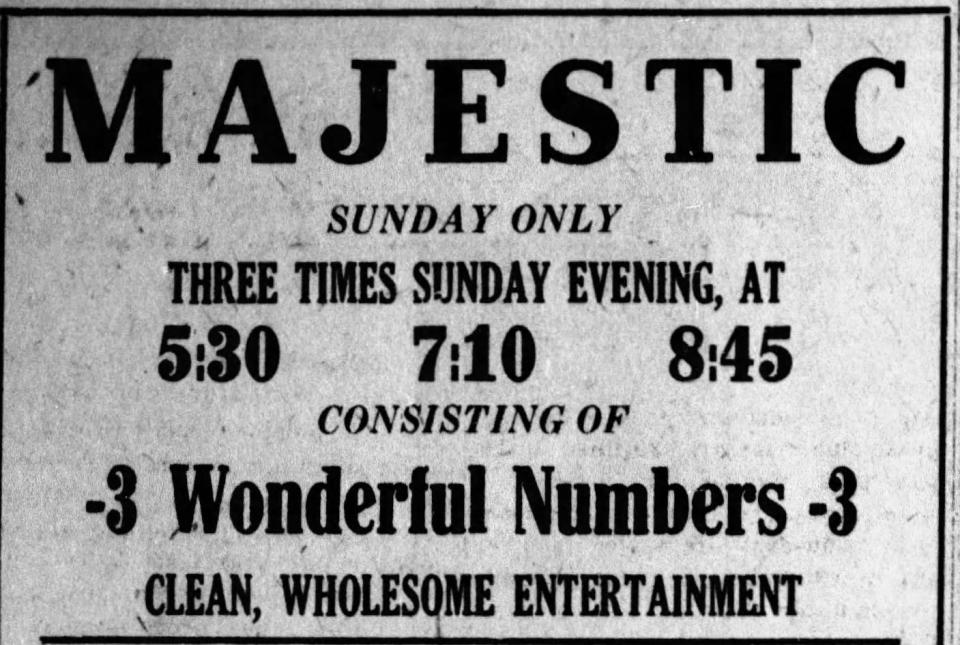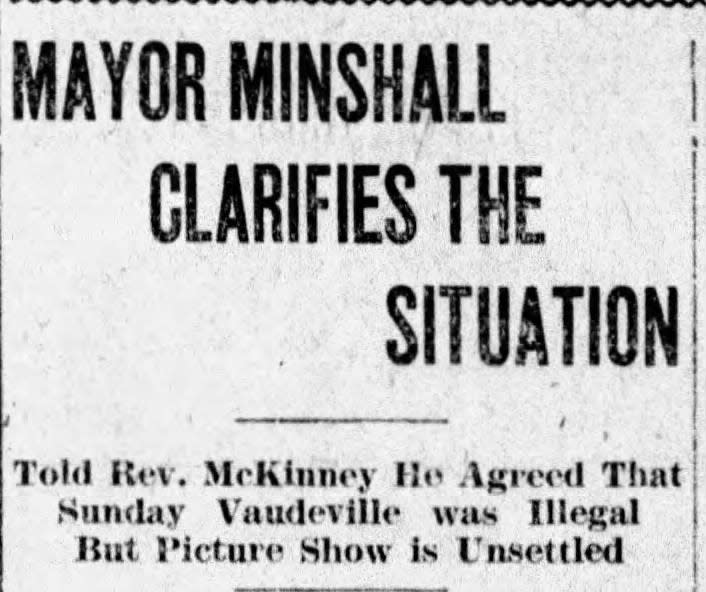Looking back: In 1923, a local reverend pushes back against 'pagan performances'
The Rev. C.C. McKinney was exhausted, physically and emotionally. It was late Sunday afternoon, Jan. 14, 1923, and he had just poured his heart out in a powerful sermon at the poorly attended First Presbyterian Church on Main Street. Disappointed by the empty pews, McKinney was sure he knew the reason for the low turnout. After all, it was the topic of his sermon.

Now, visibly worn down, the only thing left was the closing prayer.
“Please stand, bow your heads and close your eyes,” McKinney politely instructed his small but loyal congregation.
“We learned from the Civil War that we could not live half free and half slave,” he prayed aloud. “We cannot live half Christian and half pagan either. The Sabbath is being destroyed by these pagan performances.”
According to McKinney, the pagan performances destroying the Sabbath and leading his flock astray were the popular films and live vaudeville shows scheduled at the Majestic every Sunday. He was determined to shut them down once and for all.
Actually, the reverend’s ire and the seeds for his sermon had been planted one week earlier by events thousands of miles away from Chillicothe in revolutionary Russia.

Six years earlier, in 1917, the Russian people had risen up against the czarist monarchy and established the first communist state in the world. The revolution eventually devolved into a bloody civil war, but by 1923 the regime was busy implementing its Marxist program, which included an open hostility toward religion.
The Russians celebrated Christmas on Jan. 7, following the Julian calendar, and anti-religious fervor reached epic proportions on that sacred holiday, shocking the world, including the Chillicothe pastor.
Thousands of young communists paraded through the streets in various Russian cities mocking, satirizing and ridiculing religion, especially Christianity.
In Moscow, effigies of God, Moses, Jesus, Mohammed and Buddha were tossed into angry flames.
“We have destroyed the czar’s earth,” one gigantic poster read that appeared all over the Russian city. “Now it is time to destroy the czar’s heaven.”
Thousands of high school and college-aged students crowded Moscow’s streets, creating a carnival like atmosphere, shooting off fireworks, building huge bonfires and performing satirical plays ridiculing religion, which they considered “the opium of the masses.”

One play called “Immaculate Conception” included a promiscuous woman flirting with Roman soldiers. Another play caused much laughter and had students tearing down a picture of Jesus and replacing it with one of Karl Marx.
Rev. McKinney closely followed news reports about these events occurring on the other side of the world and was certain America was headed down a similar path.
“Moscow burned Christ in effigy last Sunday while Chillicothe was dishonoring Him,” he declared in his sermon, determined to use the anti-religious crusade in Russia to stir up the emotions of his congregation.
It was true that at the same time the communists were in the midst of their anti-religious frenzy, at the Majestic there were live shows, including scantily dressed female dancers and 17 unsupervised monkeys performing circus acts such as wire walking, trapeze stunts, feats of strength, riding on the backs of dogs and even playing instruments in an orchestra. Chillicothians loved it and additional performances had to be added.
McKinney hated it, of course, but although the language in his sermon was hyperbolic, he had a point about one thing. There was a city ordinance against vaudeville shows on Sundays and it was not being enforced.
The reverend was good friends with Mayor Addison P. Minshall and reminded him that he had promised to enforce all the laws. The mayor refused to comment on the matter but leaked to the Gazette that if McKinney filed an official complaint then the city would act.
Almost immediately, though, the mayor backtracked a bit and clarified his thoughts on the matter.
“Rev. McKinney and I never disagreed about the illegality of Vaudeville exhibitions on Sunday,” he insisted. Minshall also emphasized, however, that the Ohio Supreme Court had never ruled whether moving pictures were considered a theatrical exhibition.
The two friends started to get snippy with each other.
“If a car is parked the wrong way,” McKinney stated sarcastically, “the owner will be arrested, but the vaudeville artists need have no fear of police interference.”
The mayor, in response, hinted that if church attendance was down then perhaps more attractive preachers were needed.
McKinney couldn’t let that pass. “I base my pleas on the right of a taxpayer to expect that the Sabbath law should be enforced,” he countered.
Surprisingly, the local squabble was picked up by numerous newspapers across the country and soon McKinney was accused of trying to push for a constitutional amendment to compel Americans to attend church on Sundays.
McKinney answered the accusations in another sermon from the pulpit, asserting that the liquor interests and men who have no respect for the law were responsible for the propaganda.
“The church’s principal and most characteristic business is not to besiege legislatures for laws or courts for conviction, but to teach as many people as possible the joys of the Sabbath well spent,” he asserted.
During all this back and forth, the Majestic had stayed quiet on the controversy.
On the first Sunday after McKinney’s harangue against the theater, however, it had an answer.
It placed an ad in the Gazette promoting three live vaudeville acts, promising they were “clean, wholesome entertainment." Chillicothians lined up to see the shows.
The controversy between modernity and religion was heating up. Stay tuned.
This article originally appeared on Chillicothe Gazette: Looking back: In 1923, a local reverend pushes back against 'pagan performances'

